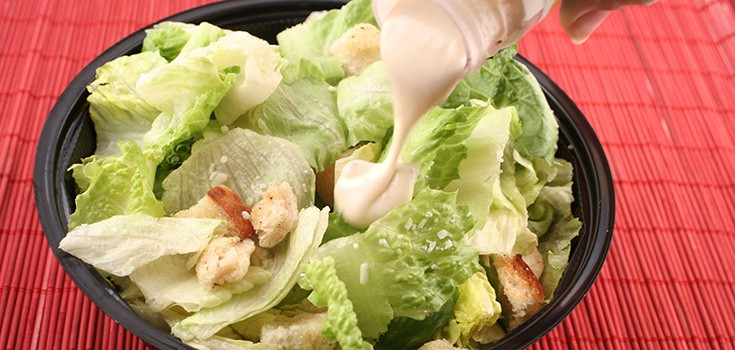Should You Really be Using Low-Fat Salad Dressing? The Answer May Surprise You

A big bowl of raw vegetables—it doesn’t get much healthier than that, right? But what you are putting on those veggies may actually decrease its health benefits. That’s right, you could be wasting your greens if you are using a low-fat salad dressing to top off your salad.
Why You Shouldn’t Use a Low-Fat Salad Dressing
A study released online ahead of publication in the journal Molecular Nutrition & Food Research indicates what you top your salad with could play a major role in the benefits you reap from the salad’s contents.
While many dieters and people trying to do the “right” thing in regards to their health might reach for the low-fat salad dressing or even nonfat salad dressings, they would be doing themselves a disservice.
According to the study, and a release from Purdue University, the fats in your salad toppings actually help you absorb the beneficial carotenoids found in your salad vegetables. Cartenoids including lycopene, beta-carotene, and lutein are linked to numerous health benefits including reduced risks of cancer, heart disease, and macular degeneration.
Cartenoids require some form of fat to become available to your body. So, non-fat dressings are a definite no. But which fats are best?
Scientists tested three types of fat on salads to determine which made the carotenoids most highly available. They used saturated fat (butter), polyunsaturated fat (canola oil), and monounsaturated fat (corn oil).
The best source: monounsaturated fat.
Monounsaturated fat-rich dressings, such as canola and olive oil-based dressings, promoted the equivalent carotenoid absorption at 3 grams of fat as it did 20 grams, suggesting that this lipid source may be a good choice for those craving lower fat options but still wanting to optimize absorption of health-promoting carotenoids from fresh vegetables.
While this particular study used corn oil, olive oil is considered an even more healthful source of monounsaturated fats. And with many varieties, it makes switching from a highly flavored salad dressing much easier.
A similar study analyzing low-fat salad dressing found that carotenoids were more bioavailable when paired with a full-fat dressing than a reduced or nonfat option.
The best salads are those that allow the natural flavors of the vegetables and ingredients to come through—not one doused in plant-manufactured dressings containing chemical ingredients. Top your salads with a tablespoon of extra virgin olive oil to ensure you get the most out of your ingredients and feel free to add some lemon juice or balsamic vinegar if you like additional flavor.
There are numerous other reasons to choose olive oil for health over low-fat salad dressing, including reduced risk of breast cancer, heart disease, and inflammation, the prevention of cancer, and the promoting of gut health.

NO NO NO, CANOLA OIL IS NOT FIT FOR HUMAN CONSUMPTION. GET EDUCATED ON IT BY READING THIS: http://www.tetrahedron.org/articles/health_risks/…
OMAR
Yes you are right. Conola is Soy and Soy is GMO.
This information serves as an eye-opener for me. We have been using low-fat salad dressing for our salads, I didn’t realize that things have different effect.